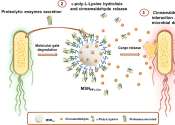Team develops an intelligent nanodevice based on a component of cinnamon essential oil as an antimicrobial agent
A team of researchers from the Universitat Politècnica de València (UPV) and the CIBER de Bioingeniería, Biomaterials y Nanomedicine (CIBER-BBN) has developed an intelligent "nanokiller" based on a component of cinnamon ...









